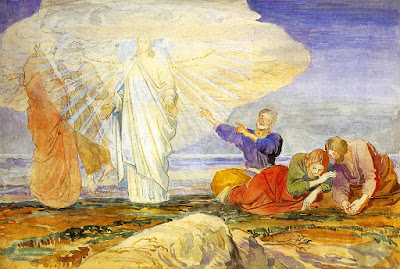The online scriptorium of author and pastor Matthew Burden
Reflections on the Christian Life
Friday, December 04, 2020
Learning to See the Unseen
It’s been an unsettling year all around, between the pandemic, drought, social unrest, wildfires, and hurricanes (not to mention the rancorous political climate in this election cycle). For many people, this has been an exceptionally hard year, and at such times it’s easy to ask questions like “Where is God in all this? Why would he allow such things to happen?” One of my great passions is the study of religious philosophy, which seeks to wrestle with questions just like these. Such questions are certainly not unique to our own time—previous generations (which, incidentally, were far more familiar with pandemics, plagues, and famines than we are) asked the same questions, and more often than not, came away with answers that strengthened their faith, rather than diminished it.
You see, serious seekers of the truth invariably come up against the fact that the evidence of reason points strongly toward our universe being carefully designed. This was obvious to the pre-Christian philosophical giants of ancient Greece, most of whom abandoned belief in the pagan gods because they had reasoned out the logical necessity for there to be an all-powerful divine Creator, far above any other gods: Aristotle’s “Unmoved Mover.” Nowadays, many people have the idea that scientific discoveries have disproven such antiquated notions. Far from it—many physicists and cosmologists, from the best universities in the world, will regularly attest to the fact that the evidence they’re discovering strangely seems to indicate that our universe was deliberately calibrated to support life.
Some skeptics, though, have started taking a different tack in recent years: exploring neuroscience to try to find explanations for why religious believers are the way they are. If only there were some kind of mental flaw or deficiency that was statistically correlated to religious belief, then they could feel vindicated in the superiority of their own beliefs. Well, as it turns out, the results are in for one such study, recently published in the academic journal Nature Communications: it shows a correlation between a neurological tendency and the likelihood of religious belief. However, it’s not a deficiency or a flaw—rather, it’s a strength. The study found that people who are better at implicit pattern recognition are more likely to be religious believers. That is to say, people who are better than average at perceiving underlying patterns in the world around them tend, more often than not, to believe in God. They seem to be able to perceive, at an innate level, the rational and physical proofs for God that philosophers and cosmologists continue to discover in the world around us.
The Bible speaks very clearly as to why a belief in God can be derived from simple observation of the natural world. The disciple John calls Jesus “the Logos” in John 1:1 (the Word, meaning the divine, ordering reason behind the universe). The Apostle Paul says that “all things hold together” in Christ (Col. 1:17), and that God’s existence and attributes have been clearly displayed in the natural world for all to see (Rom. 1:19-20). Essentially, the Bible says, all that is required is to open your eyes. The intricate, beautiful, ordered world around us cries out for an explanation as to why it is intricate, beautiful, and ordered, rather than chaotic or inert. The answer is there for all to see, for any who will open their eyes to look beyond the surface. We have a loving heavenly Father who made all that is; and all of the universe, all of history, and all of our current situations are held together in the power and grace of Christ. Our current difficulties, as hard as they might be, cannot tear us away from the sovereign love of God our Maker. We don’t always know all the reasons for why hard things happen, but we do know that we have this great consolation—the presence of a loving Designer—and that whatever comes, we may trust ourselves to his goodness.

